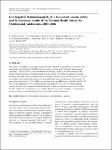Low hepatitis B immunogenicity of a hexavalent vaccine widely used in Germany: results of the German Health Survey for Children and Adolescents, 2003–2006
Jorgensen, Pernille
Poethko-Müller, Christina
Hellenbrand, Wiebke
Jilg, Wolfgang
Thierfelder, Wulf
Meyer, Christiane
Heiden, Matthias an der
Schlaud, Martin
Radun, Doris
The success of childhood vaccination against hepatitis B relies on persistence of immunity into adolescence and adulthood. In 2000, two hexavalent vaccines with a hepatitis B component (Hexavac®, Infanrix hexa®) were introduced in Germany. Hexavac was withdrawn in 2005 amidst concerns about its long-term hepatitis B protection. We compared hepatitis B surface antibody (anti-HBs) levels in children fully vaccinated with Hexavac or Infanrix hexa (n=477) in a secondary data analysis of a large cross-sectional health survey in Germany. On average 2·4 years after vaccination, 25·3% of Hexavac vaccinees had anti-HBs levels
No license information

